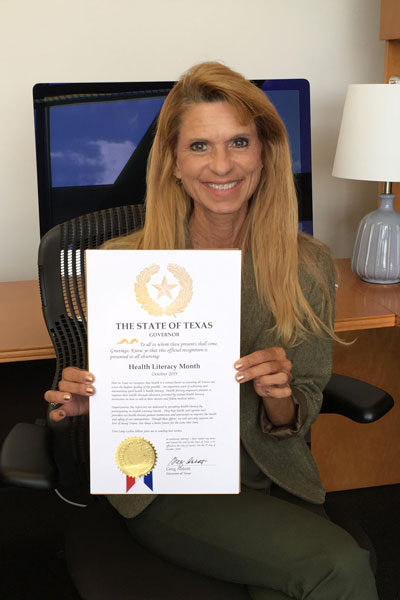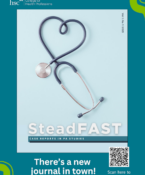Wagner sees progress in her drive to promote health literacy
By Jan Jarvis

As a registered dietician, Teresa Wagner, DrPH, RD/LD, was frustrated by how often adults failed to follow instructions regarding their health.
“It never occurred to me that there were barriers that made it hard for them to understand,” said Dr. Wagner, Assistant Professor in the School of Health Professions.
A decade later, she has become a champion for health literacy and the push to help Americans better understand how to manage their health. When Governor Gregg Abbott proclaimed October as Health Literacy Month in Texas, Dr. Wagner felt like she was really getting somewhere in her efforts to raise awareness.
“It shows acknowledgement that health literacy is an important issue that the State of Texas needs to address,” said Dr. Wagner, who also serves as Clinical Executive over Health Literacy for SaferCare Texas. “We’re making headway, but there’s still a huge need.”
When Dr. Wagner first decided she wanted to make health literacy the focus of her research, there was little talk of the difficulty patients face understanding prescriptions, brochures or their doctor’s directions. As she was earning her doctorate at the UNT Health Science Center in 2015, she began looking for ways to expand her mission to improve health literacy.
“A residency program did not exist in Texas or even the nation at that time, so I made my own,” she said.
After working on the issue in Austin, she came back to UNTHSC in 2016 and began addressing health literacy with SaferCare Texas.
Health literacy is difficult for some people to understand, but it has a big impact on the health of Texas residents and the nation. Up to 90 percent of Americans might be affected by health literacy. It costs the nation up to $236 billion annually in wasted healthcare services.
“Making October Health Literacy Month shows a commitment from the governor to address this important issue.” Dr. Wagner said.





Social media